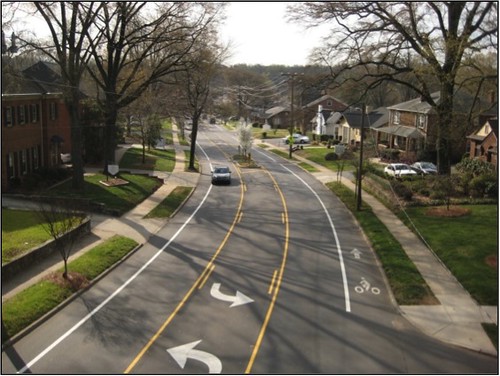Yesterday’s release of the bipartisan Safe and Complete Streets Act of 2011 is an affirmative step toward ensuring the safety and convenience of America’s streets — for everyone.
H.R. 1780, sponsored by Democratic Representative Doris Matsui of California and Republican Representative Steve LaTourette of Ohio, would require state transportation officials to consider the needs of all transportation users — pedestrians, bicyclists, transit riders and people with disabilities, as well as motorists — in every phase of planning and development.
A complete streets policy at the federal level would help ensure that miserable, dangerous streets like this become history in our communities:

Walking in the Ditch, by Transportation for America
Fortunately, we don’t have to wait for a new federal law for states and local communities to start building streets and roads to benefit our communities and make us safer. More than 200 local governments and 23 states are already doing it, leading the way for Congress. The National Complete Streets Coalition penned a report analyzing these policies and identifying best practices, findings you can learn more about here.
The top-rated policies are diverse in geography and size, and include:
- New Jersey Department of Transportation
- Louisiana Department of Transportation
- State of Minnesota
- State of Connecticut
- Mid-Ohio Regional Planning Commission (Columbus)
- Bloomington/Monroe County, IN Metropolitan Planning Organization
- Hennepin County, Minnesota
- Lee County, Florida
- Salt Lake County, Utah
- Crystal City, Missouri
- Roanoke, Virginia
- Missoula, Montana
- Herculaneum, Missouri
- New Haven, Connecticut
- Tacoma, Washington
It shouldn’t be a surprise to see complete streets policies sprouting up in places both urban and rural, red and blue. The Rockefeller Foundation Transportation Survey, conducted at the beginning of 2011, found that “safer streets for our communities and children” was voters’ top infrastructure investment priority. A commanding 40 percent listed safe streets as their first priority, and 57 percent listed it in their top two.
The federal legislation is expected to pick up additional support from both parties in the coming weeks.
The Act is a “marker” bill to be folded into what becomes the comprehensive reauthorization of the nation’s transportation law. But to get that policy folded into the bigger transportation bill, we’ll need to let Congress know that their constituents support it in our cities and communities. Over the next few weeks, we’ll be giving all of you the opportunity to call and write your Representative to urge them to join their colleagues in sponsoring or supporting this bipartisan bill. (Something you can certainly do on your own today!)
Congratulations to our partners at the National Complete Streets Coalition for this terrific news. Their hard work over the last few years has made this possible.





